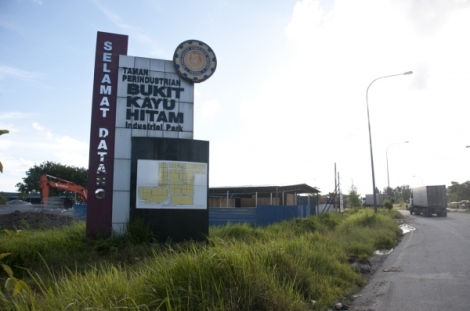Known as the “Rice Bowl” of Malaysia, the small agricultural state in the north of the peninsula did not previously place much emphasis on its 10 industrial zones, save for the lone Kulim Hi-Tech Park.
But that is all starting to change due to growing interest. Textile-based and smaller scale industries are now making way for services and high technology industries, while demand for more industrial land in the state is also on the rise.
Previously, the Kedah State Development Corporation (PKNK) did not develop many of its industrial parks due to budget constraints, but this time, it had “no choice” as there was demand from investors.
“We have logistics companies and the halal industries wanting to invest in lands in the Bukit Kayu Hitam Industrial Park and as we only have about 10 acres of land left under Phase One and Two, it is not enough so we have to expand it,” PKNK CEO Datuk Abdul Rahman Ibrahim said.
The Bukit Kayu Hitam Industrial Park, right next to the border with Thailand, is now a hive of activity, with the PKNK investing RM60 million to develop Phase Three there.

Bukit Kayu Hitam industrial estate is set to expand and to attract more logistics companies and the halal industry. | Picture by K.E. Ooi
“We are planning to develop an additional 236 acres to add to the existing 335 acres under Phase One and Phase Two of the industrial park,” he said in an interview here recently.
Works on Phase Three will start early next year and it is expected to complete in a year’s time.
The switch towards newer industries with growing markets has also allowed the state to escape the brunt of the global economic slowdown.
A few small scale and textile industries have closed down or relocated to countries with cheaper labour costs, Abdul Rahman said while noting this was not as bad as the 1997 Asian Financial Crisis.
“We only have several small scale industries closing down but due to our new regulations that allow for change of ownership of industrial lands, other industries such as medical devices of solar related industries had moved in to take up the lands vacated by those industries,” he said, though he did not want to reveal how many had since closed down or relocated elsewhere.
“It is unlike 1997 when there were a large number of retrenchments and closure of large factories as now, we are seeing closure of sunset industries but they are quickly replaced by high technology industries which are actually a good thing,” he added.
Of all the 10 industrial parks under PKNK, most were taken up except for 13 acres in Gurun, 44 acres in Kuala Ketil and the 10 acres in Bukit Kayu Hitam.
“It is a good thing that the industries investing in our industrial parks are from diverse sectors so the industries in Kedah are not greatly affected by this time’s downturn especially in the electronics and electrical sector,” he said.
In the Gurun Industrial Park, most of the industries are automotive-based while in Mergong, it is small-medium industries and the services sectors.
“In Bukit Kayu Hitam, a large portion is logistics and we are getting more interest from the halal industry there too, especially from Thailand, because the Malaysian Halal certification is recognised worldwide,” Abdul Rahman said.
On top of that, PKNK will be playing a role in setting up a planned Bukit Kayu Hitam Science Park, which is a separate site to its existing industrial park.
“It will be undertaken by a private company but PKNK will be assisting in setting up the park which will be targeting high technology industries such as in the aerospace sector,” he said.
The Bukit Kayu Hitam Science Park is one of Kedah state government’s upcoming development projects to spur economic growth in the state.
PKNK is now also seeking more funding from the federal government to set up a new industrial park in Baling.
“It is only with industrial parks that we are able to spur rapid development in a certain area as it will bring in jobs and bring in economic activities in the area,” he said.
He noted how Sungai Petani and Kulim are now thriving satellite towns due to the industrial parks that are providing jobs to the people there.
“Though manufacturing may not be the state’s main economic activity, it will at least provide some added boost to the state’s economy,” he said.
*This article was published by The Malay Mail Online. Read the original article here.
